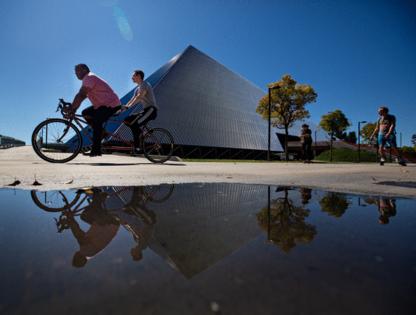Higher pay approved for Cal State University executives as university struggles to recruit campus presidents
Published in News & Features
LOS ANGELES — Amid protests from employee unions, California State University trustees on Wednesday approved the elimination of salary caps for top executives, allowing for higher pay packages as they recruit for president posts at five universities.
The new pay structure, approved 16-1, scraps a previous policy that limited the salary of a newly hired president to no more than 10% above their predecessor. It calls for executive salaries to be based on market analyses conducted at least every three years.
The policy also introduces bonuses, which will be capped at 15% of base pay. The bonuses, contingent on whether the executives meet their goals, will be funded through what one finance official described as "campus-based auxiliaries" that include philanthropic sources and private fundraising, rather than state or tuition funds.
CSU's chancellor, vice chancellors and university presidents will also receive enhanced retirement benefits and housing stipends for campus presidents will be increased.
The plan drew vehement opposition from university union members and some students, who protested Tuesday.
Kelsey Brown, a communications specialist at Cal State Los Angeles and California State University Employees Union steward, demanded that the board "prioritize classrooms over corner offices" during public comments before the meeting.
Lt. Gov. Eleni Kounalakis was the sole trustee who voted against the change.
Chancellor says higher executive pay is needed
CSU leadership has insisted that the policy is necessary to attract and retain top leaders at its 22-campus system.
"The higher education compensation landscape is evolving, and we must keep pace to attract and retain a skilled, diverse, and engaged workforce," CSU Chancellor Mildred García said at a committee meeting Wednesday.
A pay analysis presented Wednesday by the consulting firm Segal found that about 75% of comparable institutions pay executives more than CSU. The new policy is designed to position salaries at a range of 85% to 110% of the market median.
In 2025, CSU's campus presidents received base salaries ranging from about $370,000 to $530,000. Presidents who were not provided a CSU residence also received housing stipends ranging from $50,000 to $60,000.
Garcia was paid $795,000 and received a $96,000 housing stipend in 2025.
Under the new policy, the chancellor and campus presidents who do not have a CSU-provided residence will receive housing stipends ranging from $60,000 to $80,000, depending on the cost of living in their region.
Patrick Lenz, CSU's interim chief financial officer, said in an interview with The Times that several "very viable" candidates for executive positions dropped out after learning about the compensation.
Five CSU campuses have presidential vacancies, following the board's announcement of the appointment of Michael Spagna as Sonoma State's president Wednesday.
The new executive pay policy will be phased in over three years, Lenz said.
Faculty and staff unions protest executive raises amid budget uncertainties
The more generous salary plan comes as the university system grappleswith deep deficits. In October, it requested a $144 million state loan. The zero-interest loan was approved and must be repaid by July 2026.
CSU plans to spend this money on one-time bonuses for all employees. A Cal State spokesperson referred to a university statement saying that this allocation is the "most responsible and values-aligned choice," because the loan must be repaid and is not an ongoing source of funding.
The California Faculty Assn., which represents 29,000 faculty members, professors, lecturers, counselors, librarians and coaches, has clashed with CSU over the loan money. The union is pushing for base pay increases and the restoration of cut programs. Contract negotiations with the faculty and staff labor unions are ongoing.
The dispute was top of mind Tuesday morning, when hundreds of faculty and staff union members from the faculty union, CSUEU — the union representing about 35,000 support staff and student assistants — and Teamsters rallied outside the chancellor's Long Beach office, loudly chanting, singing and protesting the executive pay raise plan.
Loren Cannon, a philosophy lecturer at Cal Poly Humboldt and California Faculty Assn. bargaining team member, called the board's decision a "distributive injustice" — especially at a time when many employees are struggling to make ends meet.
Cannon said he has seen his department whittled to a "skeleton crew" since he joined Cal Poly Humboldt in 2006. He said he has colleagues who have needed to take on second jobs or live with multiple roommates.
He added that he doubts California taxpayers would support the 22 CSU presidents earning salaries on par with the U.S. president's $400,000-a-year pay.
"That's dashing the hopes and dreams of students," Cannon said. "It's impoverishing lecturers like me."
©2025 Los Angeles Times. Visit at latimes.com. Distributed by Tribune Content Agency, LLC.







Comments